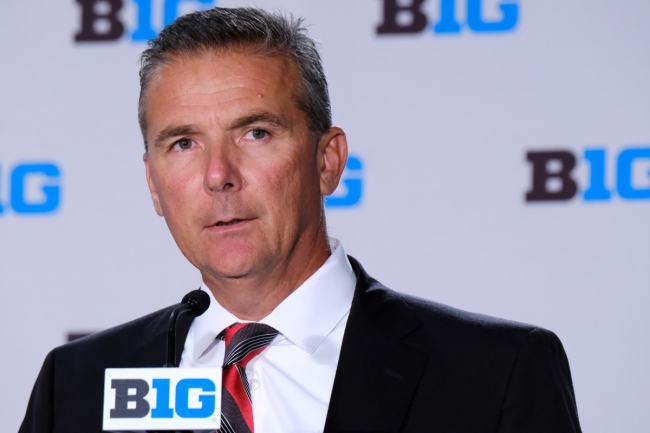You have /5 articles left.
Sign up for a free account or log in.

Urban Meyer
Getty Images
Near the end of a Wednesday night press conference in which Ohio State University announced that its head football coach, Urban Meyer, would be suspended briefly for his handling of a domestic abuse case involving a former assistant coach, a reporter asked what message Meyer had for Courtney Smith.
She is the reported victim and wife of former assistant coach Zach Smith, who was fired following accusations that he abused her on multiple occasions.
Attempting to answer the question, Meyer stumbled: “Well, I have a message for everyone involved in this. I’m sorry that we’re in this situation. And, um … I’m just sorry we’re in this situation.”
The exchange has drawn sharp criticism, with advocates for abuse survivors saying Ohio State officials glossed over Courtney Smith’s story and avoided addressing domestic violence altogether; they also declined harsh penalties for Meyer, critics say, to ensure that a winning football program is preserved.
At the press conference, Ohio State also shared the results of an independent investigation into whether Meyer knew about Zach Smith’s actions, whether he lied publicly about the extent of his knowledge and if he and athletics director Gene Smith (no relation to Zach Smith) engaged in a cover-up.
The incident, sports analysts and critics of the institution say, represents a key flaw with big-time college sports: a high-profile and winning coach who can help his institution earn cash is immunized from punishment.
“If you came from another country and were watching this press conference, you wouldn’t know the origin of this was about domestic violence,” said Gerry DiNardo, a college football analyst for the Big Ten Network. “This is an issue in this country. It manifests itself in all of our society, and this is an example of how it manifests itself in major college football.”
He said the fact that Zach Smith had long gone without punishment in the case is disappointing. “And that’s part of the definition of domestic violence: the woman never gets the benefit of the doubt.”
The Punishment
Ohio State on Wednesday announced that Meyer will be suspended without pay for the first three games of the season, against Oregon State University, Rutgers University and Texas Christian University, none of which is a particularly important game against a Big Ten Conference rival or highly ranked national power. Smith was also suspended without pay from Aug. 31 through Sept. 16.
The decision came after a nearly 11-hour meeting with the university’s Board of Trustees and President Michael V. Drake, who said the discussions were so drawn out because they wanted to consider carefully the investigation panel’s report. Journalists camped outside where the trustees met the entire day and got about 20 minutes to ask questions at the short-notice press conference.
After the press conference, reporters got a copy of the panel’s full findings, which seemed to cast doubt on whether Meyer was truthful and whether he had tried to conceal how much he knew about Zach Smith's actions. Investigators interviewed more than 40 witnesses and reviewed more than 60,000 electronic documents and 10,000 pages of Meyer’s text messages.
The report revealed that Meyer apparently attempted to dodge a public records request for text messages to and from AD Gene Smith, as well as with Zach Smith, from late 2015, when Courtney Smith accused her husband of abuse.
Student journalists at the campus newspaper The Lantern had asked for the text messages last month. The request was not honored immediately, and on Aug. 1, Stadium reporter Brett McMurphy published an interview with Courtney Smith accusing Meyer of ignoring her allegations. McMurphy had obtained text messages between Courtney Smith and Meyer’s wife from 2015, in which Ms. Meyer expressed concern for Courtney Smith’s safety. At the press conference Wednesday, Meyer said he had never seen these text messages.
According to the report, a football staffer approached Meyer and told him that a “bad article” had been published -- McMurphy's. The staffer, Brian Voltolini, director of football operations, who had received the public records request from Ohio State’s lawyer, then talked to Meyer about how to change the settings on his phone so it would only save the past year’s worth of text messages.
When Meyer finally turned in his phone, it only included text messages from the past year, but investigators could not definitively conclude that he meant to subvert the records request.
McMurphy had published another article in July that incorrectly stated Zach Smith had been arrested in 2015 for a domestic abuse charge -- in fact, police had only investigated claims. The report stated that Meyer was scheduled to appear at a large media event the day after McMurphy’s piece went public, and Meyer contacted Gene Smith and other administrators for guidance on how to handle questions about Zach Smith’s alleged conduct. Gene Smith, in a text message, reminded Meyer of the 2015 investigation and suggested some remarks for him. The morning of the Big Ten Media Days, another staffer recommended that Meyer point out that the 2015 incident had never resulted in an arrest. Meyer did not acknowledge this text message but did reply to Gene Smith’s, thanking him.
Meyer didn’t publicly acknowledge the 2015 police investigation, though. In fact, he denied knowing about it at all.
Meyer adamantly maintained to investigators that during the Big Ten media event he did not remember the 2015 investigation. The investigators could not explain this discrepancy, other than to say that Meyer has had “significant memory issues” and that he has taken medication that “can negatively impair his memory, concentration and focus.”
Despite these missteps, the investigators absolved Meyer of deliberately lying.
“Overall, Coach Meyer impressed us with a sincere commitment to the Respect for Women core value that he espouses and tries to instill in his players,” they wrote.
Zach Smith’s History
In 2009, before his time at Ohio State, Zach Smith was arrested for aggravated battery -- Courtney Smith, then pregnant, accused him of throwing her against a wall.
Courtney Smith has said she agreed to drop the charges at the urging of Meyer’s mentor, Earle Bruce, the former Ohio State coach whom Meyer referenced at Wednesday's press conference as a reason he overlooked so much of Zach Smith’s behavior.
Hiram deFries, another close friend of Meyer’s, had warned Courtney Smith that her husband would never coach again if she didn’t drop the charges. She eventually agreed.
Meyer told investigators that Courtney Smith met with him and his wife in 2009, and said she filed false information with the police -- Courtney Smith denied doing so, and Ohio State’s investigators said she likely never recanted her allegations. Gene Smith in the Ohio State investigation denied knowing about Zach Smith’s 2009 arrest, and though Meyer knew about it, he didn’t tell anyone, the investigators found. The university's background check did not unearth the arrest.
Ohio State hired Zach Smith in 2012. He faced a number of conduct issues, including on a May 2014 recruiting trip, during which he took several high school coaches to a Miami strip club. Meyer reprimanded him but did not fire him. Zach Smith also skipped recruiting trips but reported he had been there. Gene Smith suggested to Meyer he be fired -- Meyer refused, according to the report.
In 2015, Courtney Smith once again contacted police -- this time reporting that she had been abused for years, and they opened an investigation. Both Gene Smith and Meyer learned about this and monitored the investigation but did not inform the athletics department compliance office, as was protocol.
Zach Smith kept his job until July, after McMurphy’s first story about him appeared. Meyer was put on paid leave Aug. 1.
A Botched Response
Athletics experts said in interviews with Inside Higher Ed that university officials clearly attempted to save their “brand” while responding to the crisis and were not concerned for Courtney Smith’s welfare -- or about doing the right thing.
“The Board of Trustees and president have become co-conspirators to protect Ohio State football and it will be, it is, a shameful chapter,” said Gerald Gurney, assistant professor of educational leadership and policy studies at the University of Oklahoma.
Gurney said college sports as a whole has clearly not learned from the lessons of Pennsylvania State University, site of perhaps the most egregious athletics cover-up to date, involving former football coach Jerry Sandusky. Gurney rattled off a number of recent scandals plaguing collegiate athletics: the University of North Carolina at Chapel Hill escaping consequences by the National Collegiate Athletic Association for longtime academic fraud, Larry Nassar’s assaults at Michigan State University and the football-related death in June of a first-year player at University of Maryland College Park.
Just last year, University of Colorado Board of Regents suspended Philip P. DiStefano, chancellor of the Boulder campus, without pay for 10 days; DiStefano hadn't reported accusations of domestic violence against an assistant football coach.
“When is enough enough?” Gurney asked. “Why does American college sports, big-time college sports, continually have the drumbeat of these similar scenes and we do nothing about it? All for the sake of a winning program. Really?”
Nancy Neylon, executive director of the Ohio Domestic Violence Network, was particularly critical of the university’s handling of the case and its presentation at Wednesday's press conference.
Neylon noted that the university president, athletics director and Meyer all took time to apologize to football fans -- to “Buckeye Nation” -- but did not apologize to Courtney Smith. Nor did any of the university representatives mention the problem of domestic violence.
Officials could have used that platform to acknowledge the effects of domestic abuse and commit to changes -- to teach coaches and players about these issues, Neylon said.
She said Ohio State needs to reconsider all of its policies around, and training about, domestic violence, sexual harassment and assault. But she said she heard no indication it will do so. The only reference to university procedures during the press conference, she said, was an indication that officials would strengthen hiring practices.
“It didn’t seem authentic. It didn’t seem to me they understood the impact of what domestic violence does to victims,” Neylon said, adding that she “didn’t much care about the suspension, really.”
But had a coach at a lesser-known program committed the same sins as Meyer, he or she likely would have been fired, said Jon Solomon, editorial director of the Aspen Institute's Sports and Society Program. Solomon said the press conference represented a missed opportunity for Ohio State to speak candidly about domestic violence.
He said trustees probably calculated the risk versus the reward of firing Meyer, with or without cause. Either way, he said, they would be forced to pay him a large sum of money -- Meyer has publicly hinted that he would fight a dismissal, Solomon said, which could lead to a lawsuit.
Ohio State has already been swamped by the revelation that a former university doctor, the late Richard Strauss, may have molested athletes during his tenure there, which stretched back to the late 1990s. Strauss ended his life in 2005. The U.S. Department of Education’s Office for Civil Rights is looking into the allegations and into Ohio State’s handling of them.
Indeed, even the Ohio State football program has been plagued with scandal before: Jim Tressel, a onetime head coach, resigned in May 2011 after it came to light that he was aware players had received cash and discounted tattoos from the owner of a local tattoo parlor -- an NCAA violation. Tressel was suspended for two games, which was later extended to five. The starting quarterback at the time, Terrelle Pryor, was also suspended for five games.
Maurice Clarett, the star running back for the Buckeyes more than a decade ago, was suspended for an entire season in 2003 after he filed a false police report and violated NCAA rules.
But Gurney said college football fans have short memories. In this case, Meyer will soon be back on the sidelines and all will be forgiven when Ohio State wins. America will move on, he said.
“So this will continue to be repeated and we will continue to demonstrate that college sports is out of control,” he said.








